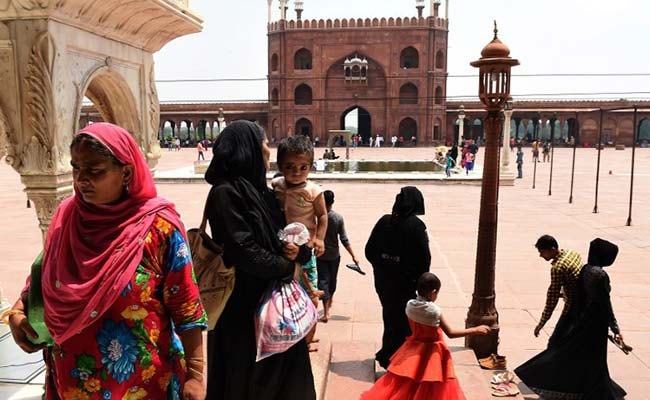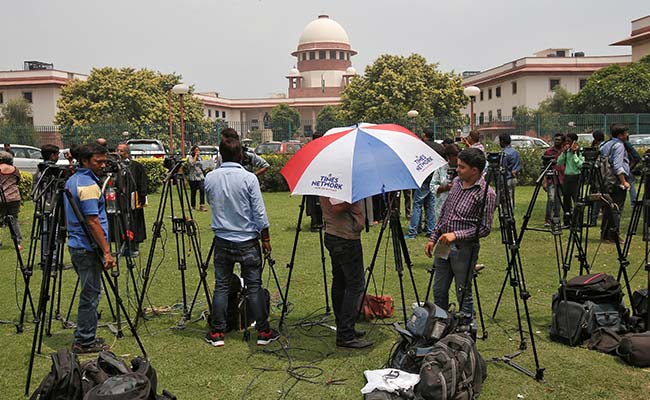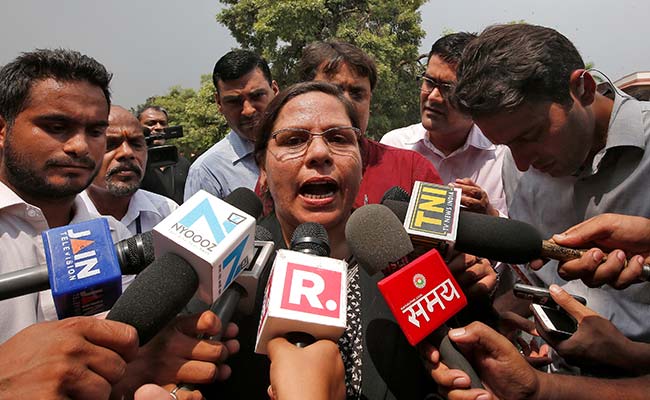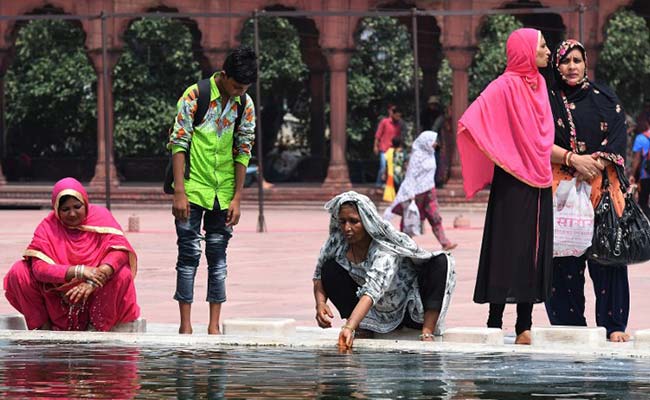
Triple Talaq has been been widely criticised for undermining Muslim women. (File)
NEW DELHI:
For hundreds of years, Muslim men in India could divorce their wives by repeating the word "talaq," Arabic for divorce, three times. On Tuesday, the Supreme Court declared the practice unconstitutional.
A five-judge bench moved to block instant divorce for six months, pending a law banning the practice to be debated in parliament.
India is one of a handful of countries where triple talaq still happens. The practice is only considered part of Islamic law by some scholars and has been outlawed in many Muslim countries.
Despite the majority of Indians being Hindu, it is home to 172 million Muslims, 14 percent of the population, making it one of the largest Muslim countries in the world.
 Family matters for the vast nation's many communities are governed by their religious traditions, making the Supreme Court's ruling in the eyes of some Muslims an intrusion in their affairs.
Family matters for the vast nation's many communities are governed by their religious traditions, making the Supreme Court's ruling in the eyes of some Muslims an intrusion in their affairs.
Triple talaq gave Muslim women in India almost no say in matters of divorce. Husbands have divorced their wives by phone, text message and mail, or sometimes in the heat of trivial marital arguments. By contrast, women almost always must obtain the man's consent for a divorce.
Justice Kurian Joseph, one of three judges on the bench who ruled against the practice, said in court, "Triple talaq is against the basis of sharia (Islamic law) ... what is said to be bad in the Holy Koran cannot be good in sharia."
Petitioners in the case, including multiple women who had been divorced by triple talaq and women's rights activists, argue that the practice did not treat men and women equally. Prime Minister Narendra Modi's Hindu nationalist government has supported them.
 "Today's judgment on one level is very historic," said Hasina Khan, from the Bebaak Collective, an organization which campaigns against the practice. "It is not a victory that has been achieved after one or two years - Muslim women have been coming to courts and filing petitions and laying the groundwork for this for years."
"Today's judgment on one level is very historic," said Hasina Khan, from the Bebaak Collective, an organization which campaigns against the practice. "It is not a victory that has been achieved after one or two years - Muslim women have been coming to courts and filing petitions and laying the groundwork for this for years."
The All India Muslim Personal Law Board, however, argued that while the practice needed reform, it should not be banned as it would prevent Muslims from practicing their faith properly.
The bench delivered its verdict to a heaving courtroom, packed with journalists and lawyers and women's rights activists, that strained to hear the final verdict.
Outside, a senior lawyer jumped in the air with glee on hearing the ruling. "This is what we wanted," she said, hugging women around her.
The issue of banning triple talaq has been at the center of national debate in recent weeks. Supporters of the practice argue that it is an integral part of Islam, and banning it could affect Muslims' fundamental right to practice their religion in India.
 Kamal Faruqui, a member of the executive committee of the All India Muslim Personal Law Board, which advocates for Muslim law said, "We don't see this as a favorable verdict. Triple talaq is a part of our religion and of sharia."
Kamal Faruqui, a member of the executive committee of the All India Muslim Personal Law Board, which advocates for Muslim law said, "We don't see this as a favorable verdict. Triple talaq is a part of our religion and of sharia."
In recent months, leading members of the ruling Hindu nationalist Bharatiya Janata Party have voiced support for women fighting against instant divorces.
Modi has been one the most vocal detractors of the practice. In a tweet sent after the verdict he wrote, "Judgment of the Hon'ble SC on Triple Talaq is historic. It grants equality to Muslim women and is a powerful measure for women empowerment."
But critics argue that Modi's party has a weak record on women's rights and is just using the issue to restrict the rights of Muslims in the country. "It looks like a political strategy," Faruqui said. "We'll work out a strategy and decide how to fight this."
Speaking to news cameras on a lawn outside the court, Zeenat Ali Siddiqui, who was divorced by her husband through triple talaq in 2015 wailed with joy. "Thousands, millions of women are crying at home," she said.
Her husband had divorced her without giving any reason, and leaving her to parent their two children alone. "Narendra Modi has ended the practice of men throwing their women out from trivial reasons like making the lentils too sour," she said. "When this happens to women, they are looked at with an evil eye. I know how it feels, because it has happened to me."
(Except for the headline, this story has not been edited by NDTV staff and is published from a syndicated feed.)
A five-judge bench moved to block instant divorce for six months, pending a law banning the practice to be debated in parliament.
India is one of a handful of countries where triple talaq still happens. The practice is only considered part of Islamic law by some scholars and has been outlawed in many Muslim countries.
Despite the majority of Indians being Hindu, it is home to 172 million Muslims, 14 percent of the population, making it one of the largest Muslim countries in the world.

A five-judge bench of the Supreme Court gave the verdict on triple talaq.
Triple talaq gave Muslim women in India almost no say in matters of divorce. Husbands have divorced their wives by phone, text message and mail, or sometimes in the heat of trivial marital arguments. By contrast, women almost always must obtain the man's consent for a divorce.
Justice Kurian Joseph, one of three judges on the bench who ruled against the practice, said in court, "Triple talaq is against the basis of sharia (Islamic law) ... what is said to be bad in the Holy Koran cannot be good in sharia."
Petitioners in the case, including multiple women who had been divorced by triple talaq and women's rights activists, argue that the practice did not treat men and women equally. Prime Minister Narendra Modi's Hindu nationalist government has supported them.

Farha Faiz, a lawyer, speaks with the media after a verdict on triple talaq.
The All India Muslim Personal Law Board, however, argued that while the practice needed reform, it should not be banned as it would prevent Muslims from practicing their faith properly.
The bench delivered its verdict to a heaving courtroom, packed with journalists and lawyers and women's rights activists, that strained to hear the final verdict.
Outside, a senior lawyer jumped in the air with glee on hearing the ruling. "This is what we wanted," she said, hugging women around her.
The issue of banning triple talaq has been at the center of national debate in recent weeks. Supporters of the practice argue that it is an integral part of Islam, and banning it could affect Muslims' fundamental right to practice their religion in India.

Many Muslim women have long called for the scrapping of triple talaq.
In recent months, leading members of the ruling Hindu nationalist Bharatiya Janata Party have voiced support for women fighting against instant divorces.
Modi has been one the most vocal detractors of the practice. In a tweet sent after the verdict he wrote, "Judgment of the Hon'ble SC on Triple Talaq is historic. It grants equality to Muslim women and is a powerful measure for women empowerment."
But critics argue that Modi's party has a weak record on women's rights and is just using the issue to restrict the rights of Muslims in the country. "It looks like a political strategy," Faruqui said. "We'll work out a strategy and decide how to fight this."
Speaking to news cameras on a lawn outside the court, Zeenat Ali Siddiqui, who was divorced by her husband through triple talaq in 2015 wailed with joy. "Thousands, millions of women are crying at home," she said.
Her husband had divorced her without giving any reason, and leaving her to parent their two children alone. "Narendra Modi has ended the practice of men throwing their women out from trivial reasons like making the lentils too sour," she said. "When this happens to women, they are looked at with an evil eye. I know how it feels, because it has happened to me."
(Except for the headline, this story has not been edited by NDTV staff and is published from a syndicated feed.)
Track Latest News Live on NDTV.com and get news updates from India and around the world

